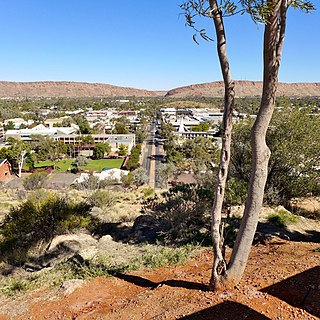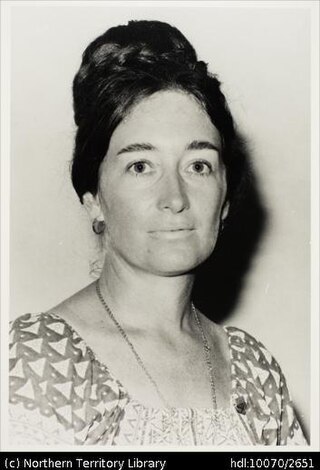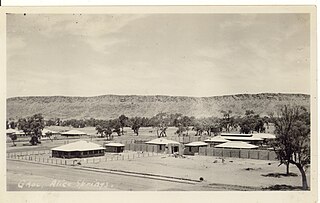Related Research Articles

Alice Springs is a town in the Northern Territory, Australia; it is the third-largest settlement after Darwin and Palmerston. The name Alice Springs was given by surveyor William Whitfield Mills after Alice, Lady Todd, wife of the telegraph pioneer Sir Charles Todd. Known colloquially as The Alice or simply Alice, the town is situated roughly in Australia's geographic centre. It is nearly equidistant from Adelaide and Darwin.

In Australia, a station is a large landholding used for producing livestock, predominantly cattle or sheep, that needs an extensive range of grazing land. The owner of a station is called a pastoralist or a grazier, corresponding to the North American term "rancher".

Curtin Springs, formerly Mount Conner Station, is a pastoral lease operating as a cattle station in the Alice Springs region of the Northern Territory of Australia.

Rosalie Lynette Kunoth-Monks, also known as Ngarla Kunoth, was an Australian film actress, Aboriginal activist and politician.
The Women's Museum of Australia, formerly the National Pioneer Women's Hall of Fame, is a museum focused on the place of women in Australian history, situated in the restored HM Gaol and Labour Prison building in Alice Springs, Northern Territory, Australia.

Alline Dawn Lawrie is an Australian former politician. She was the independent member for Nightcliff in the Northern Territory Legislative Assembly from 1974 to 1983; in the First Assembly, she and fellow independent Ron Withnall were the sole non-Country Liberal Party members.
Helen Springs Station more commonly known as Helen Springs is a pastoral lease that operates as a cattle station.
Deep Well Station is a pastoral lease that operates as a cattle station in the Northern Territory of Australia.

Andado Station is a pastoral lease that operates as a cattle station in the Alice Springs region of the Northern Territory. On the traditional lands of the Arrernte people before European settlement, the first pastoral lease was granted in 1880. The station includes the Mac Clark Conservation Reserve, created to help preserve the rare Acacia peuce tree.

Mac Clark Conservation Reserve is a protected area in the Northern Territory of Australia located in the locality of Ghan.

Mount Riddock Station is a 2,633 square kilometre cattle station in the Northern Territory of Australia. It is managed by Steve and Rebecca Cadzow. They run Poll Herefords on the property, which has organic certification.
Owen Springs Station, now known as Owen Springs Reserve is a former pastoral station and now a 1,570-square-kilometre (606 sq mi) nature reserve west of Alice Springs in the Northern Territory of Australia. The Hugh River and Waterhouse Range run through the reserve. It also features the first pastoral homestead built in Central Australia.
Jose Petrick OAM is a British-born Australian historian and community advocate living in Alice Springs in the Northern Territory.
Elsie "Ma" May Jenkins was an opal and mica miner who worked at Lightning Ridge and Coober Pedy in South Australia and Alice Springs in the Northern Territory of Australia. She is best known as the "Opal Queen" referencing her impressive opal collection.
Charlotte Bridget Somerfield is a Central Australian pioneer and entrepreneur. She and her husband had the mail contract for deliveries by camel between the railhead at Oodnadatta and Alice Springs between 1921 and 1926.
Beatrice Mary Brumby or Beatrice Bell was a pioneering woman from Central Australia and northern South Australia who contributed significantly to the development of the pastoral and tourism industries.
Vicki Darken, née Victoria Ormond, was an Australian landscape painter, based in the Northern Territory.

Gloria Ouida Lee or Siew Yoke Kwan, also known as Gloria Purdy-Lee was a Chinese-Australian miner. She was the daughter of Alice Springs Chinese Market gardener Ah Hong and his Western Arrernte wife Ranjika. Lee travelled between Australia and China and experienced discrimination because of her mixed parentage. She is included in the archive collection of the Women's Museum of Australia, formerly known as the National Pioneer Women's Hall of Fame. Her oral history is held at the National Library of Australia.
Woodgreen Station, also spelt Wood Green and also known as Atartinga, is a cattle station located in the Northern Territory of Australia, to the northeast of Alice Springs, extending approximately 2,215 km2 (855 sq mi). It was also known as (Mer) Athatheng by some of the Indigenous people in the area.

Her Majesty's Gaol and Labour Prison was a government run prison in Alice Springs in the Northern Territory which operated between 1938 and 1996. It was preceded by Stuart Town Gaol and replaced by the still operating Alice Springs Correctional Centre.
References
- 1 2 Phelan, Brendan (3 October 2012). "Remembering Molly". Australian Broadcasting Corporation. ABC Alice Springs. Retrieved 3 May 2017.
- ↑ "About". National Pioneer Women’s Hall of Fame. National Pioneer Women’s Hall of Fame. Retrieved 3 May 2017.
- 1 2 "Molly Clark". Territory Stories. Northern Territory Library. hdl:10070/218083 . Retrieved 3 May 2017.
- ↑ "Old Andado Station". Heritage Register. Northern Territory Government. Retrieved 3 May 2017.
- ↑ Serratore, Paul (25 September 2012). "Vale Molly Clark - a pioneering woman of the Outback". Australian Broadcasting Corporation. ABC Alice Springs. Retrieved 3 May 2017.